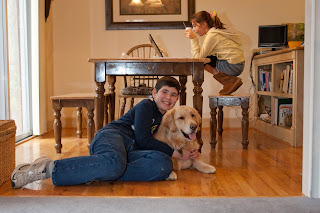In
1999 my husband and I created a family when we adopted two unrelated babies, just
16 months old, from Russia. Like all
parents we had dreams for our son and daughter to grow up happy and healthy. The
future held such promise! Later we came to find out that our son’s nightmare
began before he was even born.
When
Iyal was four years old, we learned that his birth mother had consumed alcohol
during her pregnancy. He was born with a
life-long birth defect, fetal alcohol syndrome, the most severe form of fetal
alcohol spectrum disorders (FASDs). As
in the case of most women who drink while pregnant, she probably did not know
the devastating legacy she was leaving her son.
FASD is the leading cause of intellectual disability in the western
world. This umbrella term is used to describe the range of effects that can
occur to an individual who was prenatally exposed to the toxin, alcohol.
Besides cognitive impairment it can include; social, emotional, behavioral and
physical challenges with a predisposition to a host of developmental conditions
and psychiatric illness. FASD is often
accompanied by ADHD, autism, OCD, seizure and attachment disorders.
We
realized that Iyal would always need “an external brain” to compensate for the
organic brain damage that left him vulnerable and unable to make choices for a
“happy and healthy life” on his own. We
reluctantly comprehended that while Iyal would grow up like his peers on the
outside - on the inside his development would remain stunted creating a
phenomena called dysmaturity. The gap would widen as his neurotypical sister,
Morasha, would soar through her life, unburdened by extreme impulsivity and a
lack of understanding between cause and effect.
Abstract thinking would exist very conditionally.
Perhaps
what is most agonizing about this disability is that it remains hidden or
invisible until those who experience FASDs find themselves at the center of a
tornado that has wreaked havoc for those around them. The Center for Disease
Control (CDC) states that nearly 1 in 100 live births are fetal alcohol
exposed. Half of these individuals will experience trouble with the law, and difficulty
completing school while 90% will develop psychiatric disorders and remain
unable to live independently. And yet
they “look” just like you and me.
People with developmental disabilities are often the victims of bullying and teasing
because of their unintentional behaviors and vulnerability. Research suggests that building a circle of
support or community for those living with disabilities strengthens the outcome
for the individual. So how could we do
this when the disorder rendered Iyal unable to interact with others in a
meaningful way?
We
struggled as traditional therapies were not helping Iyal to “function” in his
world. The decision to obtain a service dog for Iyal rose out of frustration,
heartache and the desire to find a way that Iyal could feel more grounded. It
became evident that we had to “think outside the kennel”. Were any dogs being trained to support
children living with FASDs? Not until
Chancer, Iyal’s impeccably trained 90-pound golden retriever. Since 2008, when Iyal obtained the first
certified FASD Assistance Dog in the world; so much has changed!
As
a service dog, Chancer’s presence legitimizes his invisible disability. He
validates Iyal’s experience – even if it appears like willful disobedience to
others. He provides sensory support when
Iyal feels overstimulated or “hyper”.
Difficult emotions and behaviors are mitigated through Chancer’s
training through behavior disruption. He
functions as Iyal’s ambassador to the world paving a path for communication and
acceptance while lowering anxieties.
Their mutual love is profound.
We
are thankful for the gift of our children, the understanding of disabilities we
have gained and the opportunity to help others.
As a family, we advocate for those who are differently-abled. Morasha’s award-wining book, “My Invisible
World – life with my brother, his disability and his service dog” offers support
internationally to siblings of those with special needs. Our story is being developed into a movie to offer
hope to other families who struggle with similar challenges. That’s a lot to be thankful for…


No comments:
Post a Comment